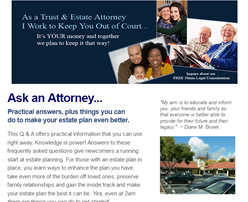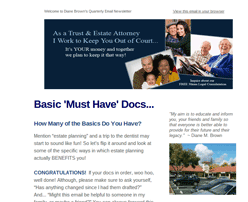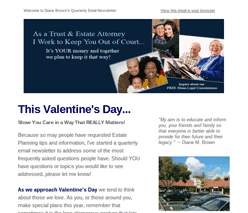Charitable Giving – Part 1
Categories: Charitable Giving and Trusts
 When setting up an estate plan, you can have your cake and donate it too via charitable giving! Everyone knows that a charitable donation results in an immediate charitable deduction on the year’s income tax returns. However, did you know that you can give away an asset and still have the benefits of ownership during your lifetime? You can! You simply need to understand a few things.
When setting up an estate plan, you can have your cake and donate it too via charitable giving! Everyone knows that a charitable donation results in an immediate charitable deduction on the year’s income tax returns. However, did you know that you can give away an asset and still have the benefits of ownership during your lifetime? You can! You simply need to understand a few things.
What is a Charitable Remainder Trust?
If you have an appreciated asset (real property, for example) and would like to retain an income stream without realizing immediate taxable gain, then a charitable remainder trust is something to consider. The Donor gives the asset to the trust, then the trustee sells the asset and invests the proceeds. The Donor receives an income for life or a period of years. After the termination of the Donor’s interest, the trust is distributed to the charity. The donor receives a charitable deduction the year that the asset is transferred to the trust.
What are the Different Types of Charitable Gifts?
Contributions to charity, either during life or after death can have a beneficial impact upon the taxable income or estate of the donor.
Outright Gifts During the Lifetime of the Donor – An outright gift to charity will normally result in an income tax deduction for the gift. The amount of the deduction and availability will depend upon the nature of the charity, the type of gift, the value and tax basis of the property given, the timing of the gift and the other sums given to charity by the donor. The type of organizations which qualify for the maximum deduction are listed in Revenue Code Section 170(b)(1)(A)(i) through (viii).
Gifts of Property Other Than Cash – Contribution of property other than cash is deductible to the extent of the fair market value. However, special rules apply to a gift of appreciated property.
Gifts After Death of the Donor – Outright bequest to charitable organization is deductible from the gross estate in computing the net taxable estate.
If you would like to learn more about your best options regarding charitable giving, you are welcome to come in for a free consultation. Simply call to schedule a time and bring in this Free Consultation Certificate when you visit.
Read Charitable Giving – Part 2 which addresses “Gifts of Split Interests,” including Charitable Remainder Trusts and Charitable Lead Trusts.
 Diane M. Brown, Esq.
Diane M. Brown, Esq.
Working every day to keep my clients out of court!
It’s your money… Let’s keep it that way!
Call 408-364-1234
This blog contains general information and is not meant to apply to a specific situation. Please seek advice of counsel before proceeding as each case is unique.
Photo Credit: Diane Brown’s photo by Lisa Whalen.






Trackbacks/Pingbacks
[…] Read Charitable Giving – Part 1 […]